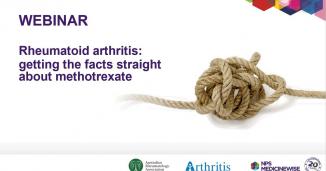New treatments inflammatory arthritis
View transcript
New Treatments for Inflammatory Arthritis
Assoc. Professor Peter Youssef
Rheumatologist, Royal Prince Alfred Institute of Rheumatology and Orthopaedics, Sydney
Chair – Arthritis Australia Scientific Advisory Committee
Even though arthritis may be a long-term disorder, we now have excellent treatment that can control the disease, improve pain, and maintain function. Our treatments can keep people at work, can improve their life expectancy. It is very important for patients to realise that modern treatment can control the disease and allow patients to experience almost normal function.
Dr. Irwin Lim
Rheumatologist
The last 10 to 15 years in rheumatology has been a Golden Period. There’d been very many effective new medications for inflammatory arthritis and mainly these are the biological disease modifying agents. They’ve proven extremely effective for some patients and what they’ve also taught us is how to use the olden medications more wisely.
Dr. Samuel Whittle
Rheumatologist, The Queen Elizabeth Hospital, Adelaide
This is a really exciting time to work in the field of rheumatology. Over the last 20 years we’ve really seen two major changes in the way we manage inflammatory rheumatic disease and also in the outcomes that we see.
Dr. Mona Marabani
Rheumatologist
President, Australian Rheumatology Association
Well I’ve been a rheumatologist for 25 years and when I first started in practice we had a very tentative approach as to how we should treat these types of inflammatory arthritis, and it was very softly, softly approached. You should go hard at the beginning, treat it intensively and go for remission and see this as a realistic goal, and we’ve discovered that with existing disease modifying drugs like methotrexate we can do that effectively.
Dr. Samuel Whittle
Rheumatologist, The Queen Elizabeth Hospital, Adelaide
Two major changes have happened in about the last 20 years. Firstly, we’ve learnt that if we treat these diseases earlier in the disease course and more intensively with therapies, that we can often completely eliminate the inflammation that underlies these diseases and that can then prevent damage to the joints, it can allow people to remain in the workforce, and to essentially lead completely normal lives. The second exciting thing that’s happened over the last 20 years is that we’ve had a lot of new therapies become available to us. We have several therapies already for rheumatoid arthritis but we now have a whole host of newer therapies that simply gives us more options in being able to individualise our treatment to every patient. For diseases like ankylosing spondylitis we now have therapies that are far more effective than anything that was available even 15 years ago.
Dr. Mona Marabani
Rheumatologist
President, Australian Rheumatology Association
The other thing that’s been an enormous change is the advent of the biologic drugs. These have really been life-changing drugs. These have really been the most extraordinary development for people with inflammatory arthritis.
Dr. Irwin Lim
Rheumatologist
Success breeds success and the fact that we now have more potent medications means that our expectations have changed; so the playing field has changed.
Dr. Marina Kang
General Practitioner
Realistically now that we have such a foundation of medications and physical therapies, appliances that can be used, independent living centres and resources that we have available; there really should be very minimal impact of the condition in most patients with any of these conditions: rheumatoid arthritis, psoriatic arthritis, or ankylosing spondylitis.















